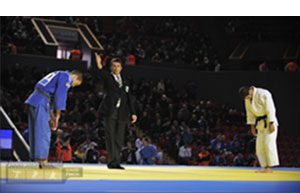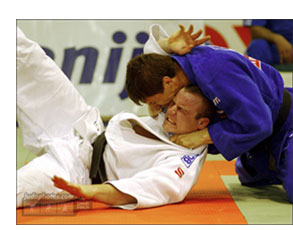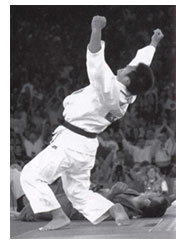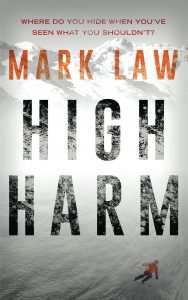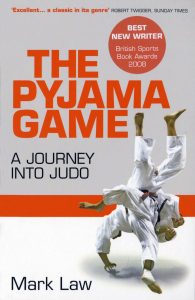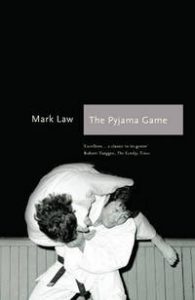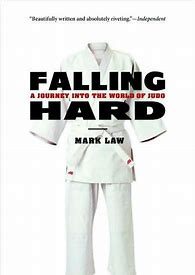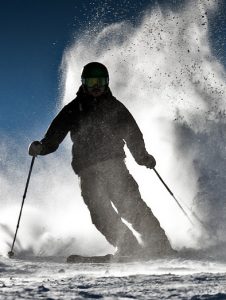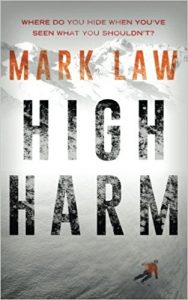

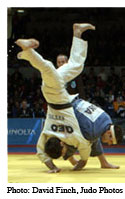
‘Fighting is what happens when people carry on playing after you have taken away the ball.’
‘If they could see on my face what I feel in my heart no one would ever fight me’ – Yasuhiro Yamashita
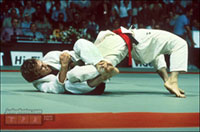
‘I had no choice but to keep on twisting the arm . . . finally the sound of bone breaking echoed through the Maracana stadium.’
Masahiko Kimura
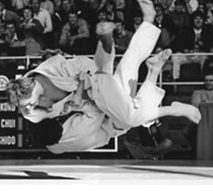
Do it right and you are Becker, you are Beckham; do it wrong and you are Tom – after Jerry has given him the exploding cigar.
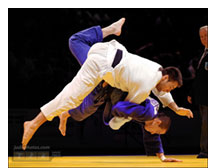
In their effort to turn their athletes into virtual fighting machines it was inevitable that the East Germans would make them fight real ones.
I felt that, even in sporting terms, this was an extraordinary world. And I had landed in the middle of it.
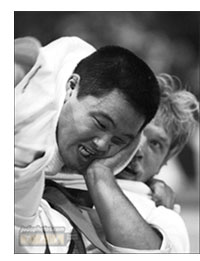
‘Anyone who struggles to believe that judo builds character might find it easier to accept that judo certainly reveals it.’
‘Well, Mark, he made you look a bit of an idiot,’ said Jim. But I knew I would soon be boasting about the day I fought Hirotaka Okada, twice champion of the whole flipping world.
THIS ONE iS FOR REAL
Feb 2019
PUTIN, JUDO, FOREIGN POLICY RUSSIA
Vladimir Putin and judo – a remarkable but little known truth
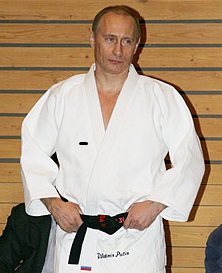
Commentators cite judo’s guiding principle as an influence on the Russian President’s conduct of world affairs. MARK LAW argues that they usually get it wrong.
The Kremlin’s development of a new cruise missile is just the latest in a lengthy list of gratuitous aggressions by Vladimir Putin which range from military harrassment and territorial invasion to cyber sabotage and political assassination. Why is he going on like this?
In their efforts to provide an answer some commentators alight on one facet of his background that marks out the Russian President as different – his expertise in judo. And what is the single fact that everyone knows about judo? Well that’s the one where you defeat your opponent using his own strength against him. But as a theory to explain Putin’s behaviour it doesn’t work. Most of Putin’s opponents don’t have very much in the way of strength and anyway, that characterisation of judo is inaccurate – it’s more about using an opponent’s movement which is something quite different and sounds rather less interesting.
His inner circle includes
a group of billionaire oligarchs known as the judocracy
We do know that the judo is important to Putin; he says it has changed his attitude to life and ‘helps one to remain calm and react quickly’. He has encouraged oligarchs to bankroll judo in Russia. The man who coached him as a schoolboy was, until his death in 2013, part of the President’s inner political circle. This includes a group of billionaire oligarchs collectively referred to as ‘the judocracy’ who were sparring partners in his school days. When visiting a martial arts club in Moscow, the Putin said, ‘The atmosphere here is like home to me.’
We can probably gain more of an insight into the President’s behaviour if we ignore the stuff about using your opponent’s strength and focus instead on the kind of attitude prevailing in a commited competition fighter which Putin was. He came to judo as a small schoolboy who had to learn to defend himself on the streets of Leningrad. Amateur sport in USSR was then organised under the aegis of the trade unions; Putin was a member of Trud which was for workers in heavy industry; significantly his Leningrad club served a plant producing gas and oil pipes.
He had some success as a junior competitor but in 1975, aged 23, he joined the KGB which actively encouraged his sport. A former Soviet judo instructor told me how it was compulsory for some KGB to practise a martial art and one of his duties was to sign their attendance books to verify that they had done their training. In the following year Putin became a lightweight champion of St Petersburg, a decent achievement given that judo is hugely popular in Russia and standards are high. To get that title Putin would have been sparring on the mat for a couple of hours at least three times a week as well running every day and undergoing strength and fitness training in the gym. The KGB would have doubtless given Putin time off from his state security duties to help him prepare for competition. A judoka who had competed for the Russian army once boasted to me, ‘I had so much time training that I never once had to touch a Kalashnikov’.
Judo is the only Olympic sport that permits torture
To understand the attitude that informs competitive as opposed to recreational judo in Russia – and indeed anywhere else – consider the story of a great Japanese champion who came as guest instructor to the Budokwai judo club in Chelsea. He was famous for the utter beauty and clinical precision of his technique. Wondering what jewel of technical wisdom he would offer his students were startled by his opening words, ‘The first thing is to smash your opponent!’ Another instructor at the same club, a former Olympian, used to say, ‘First of all you must destroy their grip, then their rhythm, their balance, their morale, their will and their technique’. He saw competition as a sort of unpleasant converse of St Francis of Assisi’s famous prayer, ‘Where there is harmony, may we bring discord, where there is hope may we bring despair.’
Judo is certainly rich in opportunities to bring despair – it is the only Olympic sport that permits torture in that contests can be won by forcing an opponent to submit to an arm-lock, choke or strangle. All this maybe quite appealing to a KGB functionary.
Any combat sport is a microcosm of warfare and shares its dictums. These emphasise the importance intelligence gathering (there is systematic videoing of opponents at competitions), surprise (using sudden changes of direction or unexpected techniques) and deception (feint attacks and distraction). It’s also important to find and exploit an opponent’s weakness. Confronted by Obama’s feeble red lines, harmless citizens in Salisbury and mutilated children in Syrian hospitals Putin has been spoilt for choice. As for Trump, if the collusion theorists are right he is already Moscow’s patsy and would presumably shirk any fight.
His approach may well have been shaped by judo’s demand for constant aggression
Putin’s approach to his adversaries may well have been shaped by judo’s demand for constant aggression from contestants who are penalised or even disqualified for failing to attack. The variety, pace and frequency of Putin’s international transgressions suggest the influence of the Russian doctrine devised for unarmed fighting: ‘the Concept of Permanent Combat’ which demands the closing down of those gaps in the action as combatants try to regain their breath and posture and give an opponent no chance to recover let alone fight back. Putin must see himself as a participant an unending contest refereed by the Russian electorate in whose eyes he must always be on the attack, always threatened but always winning.
Judo has served Putin well and not just by giving him a pair of pectorals which he feels he can share with the electorate. His status as a judoka brings him a popular appeal because Eastern Europeans generally value leaders who are strong in every sense; many of their leading politicians and gangsters – it’s often quite difficult to tell them apart – have been weightlifters, wrestlers and boxers.
Dr Kano created a safe but
full-contact fast and beautiful
fighting language
Putin could do us all a favour if he spared a thought for an extraordinary man called Dr Jigoro Kano to whom he, like all judoka, owes so much. As a young schoolteacher in Japan in the 1880s Kano distilled the brutal Samurai battlefield techniques of jiu-jitsu to create a safe but fast and beautiful full-contact fighting language which he called judo. Later to become Minister of Education, the high-minded Kano saw his art as an educational tool, a training for life and even a way to world peace. He loathed the Japanese militarism of his dying days in the 1930s and would despise Putin if all he has taken from the sport is a misguided lesson on the efficacy of violence and torture. We will probably never know the truth about that but just as it is said that the battle of Waterloo was won on the playing fields of Eton, they might well one day say that Ossetia, Chechnya, Eastern Ukraine, Syria – and who knows where next – were won on a judo mat in Leningrad.
Mark Law is the author of The Pyjama Game, A Journey Into Judo and the organised crime thriller High Harm

SOME REVIEWS for THE PYJAMA GAME – A JOURNEY INTO JUDO
Approaching his 50th birthday, Mark Law decides to take up judo and his initial interest becomes an obsession, then a book. The result is a fascinating journey in which he unravels this most opaque of sports with humour, verve and style. Part travelogue, part history, part chronicle of midlife discovery, The Pyjama Game is an illuminating exposition of an enigmatic and marginal sport’
James Corbett, OBSERVER
‘This is a must-read for every judo enthusiast’
Jimmy Pedro, WORLD CHAMPION & OLYMPIC MEDALLIST
‘Excellent . . . a classic in its genre’
Robert Twigger, SUNDAY TIMES
‘Beautifully written, and no interest in the martial arts is required to find it absolutely riveting’
INDEPENDENT
‘If you really want to be bowled over by a book about a martial art then you really must read this extraordinary book. It is absolutely hilarious in parts, extremely well researched throughout and totally absorbing. I couldn’t put it down and read it twice. Next year I will read it again’
David Finch, JUDOPHOTOS
‘A book that will be riveting to those who practice martial arts and those who don’t. As a 49-year old who never did sport, the author took up judo. The book is partly his story, mostly that of the people who made the discipline. It’s beautifully written and very funny’
John Meaney, COGNITIVE RESONANCE
‘One of the year’s most entertaining sporting books, and the best one to be written about a martial art since Robert Twigger’s Angry White Pyjamas. It’s lively, it’s witty and, above all, so persuasively enthusiastic that by the end you’ll find yourself feeling an intense urge to try it for yourself’
James Delingpole, MAIL ON SUNDAY
‘I loved The Pyjama Game. It is one of the few books that makes judo understandable to a non-judo audience. It transmits some of the beauty and magic of judo while explaining the rigors of training and heartbreak of competition’
JUDO INFORMATION SITE
The retitled US edition
‘Through his own observation of the sport and as a spectator, he is able to capture the feeling of an elite competitor. I know this feeling too well and it never lessens with experience’
Kylie Koenig, AUSTRALIAN JUDO SQUAD
‘At last someone has written a book that examines every facet of the sport. The Pyjama Game is by turns hilarious, intriguing and even horrifying’
Yogi Marlon SPORTS WRITER
‘It is a fantastic read for all judokas, but unlike some sport books it is a mesmerising read for a wider audience . . . a book judo will be proud of’
MATSIDE MAGAZINE
‘The Pyjama Game: a fantastic voyage, beautifully written, through this most challenging of sports’
INDEPENDENT ON SUNDAY
‘This is damn fine stuff, and will entertain and enlighten an audience far beyond the confines of the dojo’
Andrew Baker, DAILY TELEGRAPH
‘A brilliant exploration of judo’
Matthew D’Ancona, SPECTATOR
Published by Aurum Press
www.thepyjamagame.com

